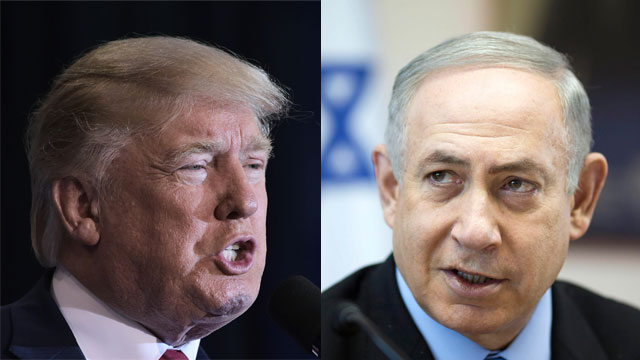
US President Donald Trump. Rejecting, not adopting, the pillars of Obama's policy
Photo: Reuters

The presidential settlement approval
Op-ed: Trump’s statement reflects a completely new American policy. It gives the Israeli government the green light to build as much as it wants in the territories, as long as the construction does not go beyond the settlement borders. And even if Israel does build beyond those borders, never mind.
We can’t be sure—with President Donald Trump one can never be sure of anything—but we must be prepared. Prepared for a sharp turn in the White House’s stance on the settlements. It is included in Trump’s statement,
signed by the White House press secretary, which was issued after Prime Minister Benjamin Netanyahu’s announcement to approve the establishment of a new Jewish community in the territories. The press secretary repeated the statement word for word in a press conference on Friday.

For close to a quarter of a century, Israel’s governments have avoided approving the establishment of new settlements in West Bank and have stressed that any construction in the territories is carried out only within the “boundaries” of existing settlements. The borders are wide enough to take in half a million more Jews, without crowding. Netanyahu’s announcement contradicts this unwritten principle, and in normal days we would expect, therefore, a harsh condemnation from the White House.

Trump and Netanyahu. It’s no coincidence that the term ‘two states for two people’ was excluded from the White House statement (Photos: EPA, AFP)
But these are not normal days. Trump’s statement is not only worded loosely, far from a condemnation, it also reflects a completely new policy. It states that the American administration does not perceive the existing settlements as “an impediment to peace.” It states that only the construction of new settlements and the expansion of existing settlements beyond their current borders “may not be helpful in achieving that goal”—the goal defined as “peace between the Israelis and the Palestinians.”
The obvious conclusion, exposed to all, is that Trump is giving the Israeli government the green light to build as much as it wants in the settlements in the territories, as long as the construction does not go beyond their borders, borders which were drawn by Israel itself. And even if it does build beyond those borders, never mind. The presidential statement further clarified that Trump had yet to form his final position on the issue. He is looking forward to his meeting with Netanyahu.
If that is not a change, what is a change?
A group of commentators in the American and European media have yet to shake off their perception of Trump as the successor of previous presidents, rather than as a populist revolutionist. The same applies to his attitude towards the settlements: See, “Trump is embracing the pillars of Obama’s foreign policy,” those commentators rejoiced. Nothing of the kind. He is neither embracing nor stroking—he is rejecting.
It is no coincidence that the presidential statement, as well as Trump’s few comments on the Israeli-Palestinian conflict, does not include the term “two states for two people.” Trump obviously does not believe in the feasibility of such a solution and is leaning towards a different kind of arrangement, based on the autonomy idea, the Palestinian “self-government.”
The self-government idea was first raised in the 1977 Camp David Accords. The term “self-government” from 40 years ago is equal to what Netanyahu defines as a “Palestinian state minus” or an “authority plus,” in post-Oslo language. The idea, it seems, is a hybrid in which the area between the Mediterranean Sea and the Jordan River is controlled by one supreme security sovereign, Israel, and the remaining civil sovereignty is divided somehow between Israel and the Palestinian autonomy (Republic? Community?) which will have most of the characteristics of an independent state, without being one.
It is quite possible that the kingdom of Jordan will also be invited to take part in the arrangement or the deal—a word Trump is particularly fond of—which will essentially reflect the existing situation in the territories. Not a single settlement will be evacuated. At most, it will be moved. This is a huge difference: During the days of Ariel Sharon and George W. Bush, the Jewish communities were evacuated from the Gaza Strip and their residents were moved to Israel. During the Netanyahu and Trump days, Amona was only moved and its residents were not uprooted, but driven (against their will) a few kilometers within the West Bank.
The White House statement on the settlements goes very well with the new administration’s foreign policy. Trump may not want to cancel the nuclear agreement with Iran with a single blow, but he won’t shed any tears if the agreement collapses as a result of Iranian moves and American reactions. The sanctions he imposed on Iran over the weekend prepared a fast route in that direction. And let’s not rule out American military activity in North Korea, if Pyongyang is tempted to test a long-range nuclear missile.
With Trump, as I said, it’s hard to know in advance which direction the capricious wind is blowing in, but one thing is certain: It will be different from what we were used to in the past.
















